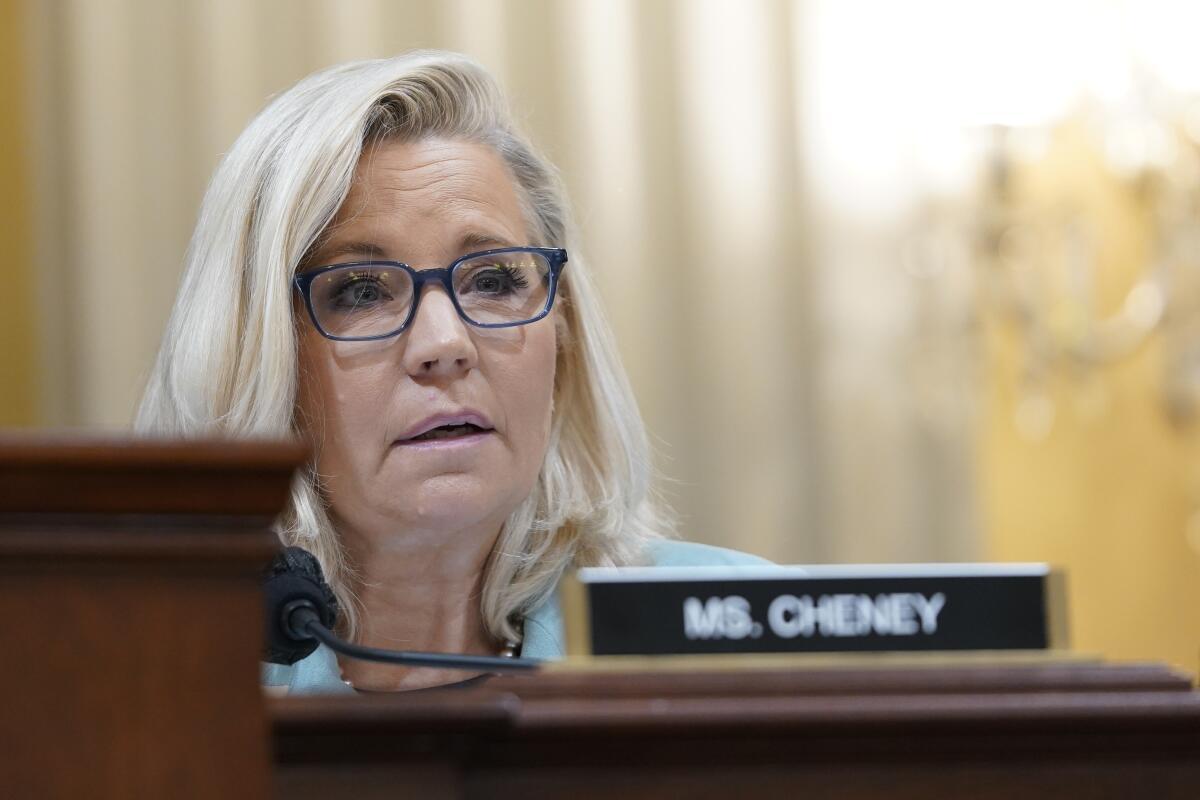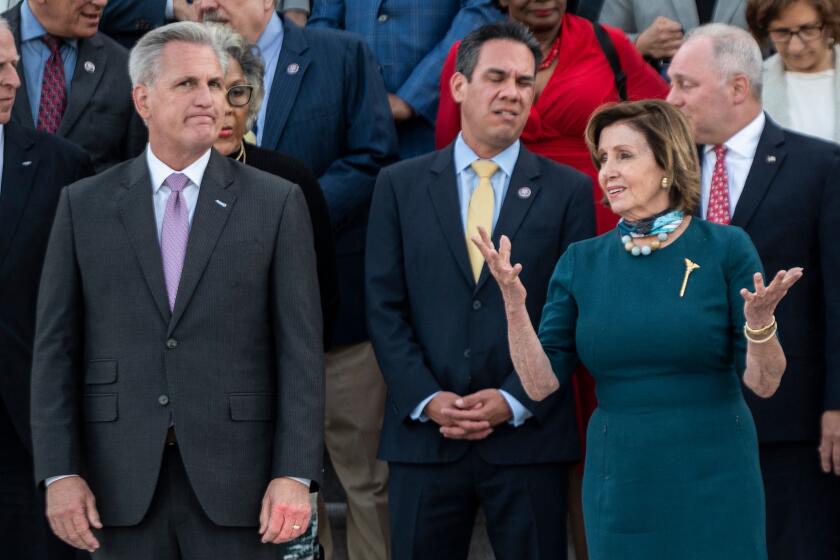Column: Cynical Republicans want to know: What’s Liz Cheney getting out of this?

- Share via
The following paragraph from a recent Washington Post article about Rep. Liz Cheney (R-Wyo.), the co-chair of the Jan. 6 committee, says a lot about how Washington thinks:
“Cheney’s Republican colleagues have struggled to understand her motives, especially given the political price she is paying in Wyoming, where Trump celebrated his largest margins of victory. Some wonder whether she is angling to run for a higher office.”
In other words, it is inconceivable to her fellow Republicans that Cheney would defy her own party and participate as one of only two Republicans on the committee investigating the Capitol riot, taking such an outspoken anti-Trump stance that she has jeopardized her reelection chances — unless she had a secret plan to benefit herself.
Opinion Columnist
Nicholas Goldberg
Nicholas Goldberg served 11 years as editor of the editorial page and is a former editor of the Op-Ed page and Sunday Opinion section.
Apparently, putting one’s own ambitions aside for the greater good is simply not done in polite political society, so they figure there must be another explanation.
The Post attributed these cynical suspicions about what motivates Cheney to her GOP colleagues in Congress. But I wouldn’t be surprised if they’re shared by many Republican voters as well, given how little faith most have in their elected representatives.
After all, most Americans, Gallup has found, see members of Congress as corrupt, out of touch and not focused on the needs of constituents. Nearly two-thirds of Americans in a Pew survey said it’s difficult to know when public officials are telling the truth.
So it should come as no surprise if voters — and other politicians — don’t trust Cheney’s explanations or if they believe she is “angling” for herself. After all, they figure, isn’t everybody?
Well, no, not everybody.
I realize we’re in an era of deep alienation from government. But even Republicans should acknowledge what Democrats are coming to see: that Cheney may be one of those rare, but not yet extinct, specimens — an actual living, breathing member of Congress with beliefs she won’t toss aside just because they’re not politically expedient.
For the record, I don’t agree with Cheney on much. She is strongly anti-abortion rights, wants to build former President Trump’s border wall, voted to repeal Obamacare and opposes much gun control legislation, to name just a few positions I oppose.
Got a precedent you don’t like? Now’s your chance to have it struck down by a newly aggressive conservative court.
But I’ve been deeply impressed by her no-nonsense, fact-filled narration of Trump’s sinister plot to cling to power. She seemed especially believable — and correct, to boot — when she argued on the first day of public hearings that protecting America’s fragile democracy is a bipartisan obligation, that members of Congress owe allegiance to the Constitution not to their party and that to defend Trump is to defend the indefensible.
Challenging one’s own party as forcefully as Cheney has may be unusual. It may be politically unwise. But I don’t see why it should be dismissed as insincere or self-serving.
Especially since there’s no question that bucking the GOP is costing her votes at home in Wyoming, where she faces a tough primary challenge in August and appears to have fallen behind her Trump-supported opponent by double digits. She’s also been abandoned, attacked and punished by the House GOP leadership in Washington for her unflinching anti-Trump positions.
Her outspokenness has come at a steep price. But she did what she had to do.
And sure, someday the mood may shift and she may run for higher office. If she does — well, good for her. She’d be an entirely reasonable candidate to represent the non-insane wing of the Republican Party.
Meanwhile, here’s the broader point that the critique of Cheney brings to mind: I think Americans are more cynical these days than they ought to be.
I’m not saying voters should be naively trusting of politicians. We need to be wary and watchful, and we should refuse to accept political pabulum. Skepticism is mostly a good thing, especially in the era of Trump and Trumpism.
Andrew Giuliani’s resume is thinner than wallpaper. All he’s got going for him is the family name. And that’s been tarnished, hasn’t it?
Cynicism, on the other hand, can be corrosive. Cynicism — in this case, the belief that nearly all elected officials are dishonest and self-serving — is associated, according to fivethirtyeight.com, with support for extremist, outsider candidates who are likely to break taboos and weaken democratic institutions. It’s also associated with decreased support for government programs in general, including public education.
The fact is that not all politicians are out only for themselves — and there are ways to distinguish the principled from the craven.
One indication is whether, like Cheney, they’re willing to take unpopular, controversial stances.
Before becoming president, John F. Kennedy wrote “Profiles in Courage,” about eight American senators who he argued had risked their political futures to defend democracy, including John Quincy Adams and Sam Houston.
President Obama has spoken about members of Congress who lost their seats because they voted for the Affordable Care Act. He cited their “desire to maintain a reputation for integrity that is stronger than the desire to maintain office.”
Sen. John McCain (R-Ariz.) took stances on principle rather than partisanship. His vehement opposition to George W. Bush’s torture policies, for instance, traced back to his years as a prisoner of war in North Vietnam.
Then there were the Republicans who put politics aside to oppose Richard Nixon as the Watergate scandal unfolded.
Was Nancy Pelosi right or wrong last year when she refused to seat two Republicans on the committee investigating the events at the U.S. Capitol?
More recently, Georgia Secretary of State Brad Raffensperger, a Republican, stood up to Trump and his own party, pushing back against pressure to “find” more than 11,000 votes to reverse the outcome of the 2020 election in that state.
Some politicians risk their careers to act in accordance with their consciences, and should be praised. Others don’t. House Minority Leader Kevin McCarthy (R-Bakersfield) and his followers, for instance, have behaved spinelessly and cynically, falling in line like sheep to avoid antagonizing Trump.
In May, Cheney drew the lines clearly.
“We face a threat we have never faced before: a former president attempting to unravel our constitutional rights,” she said. “The question for every one of us is, in this time of testing, will we do our duty?”
That is indeed the question, and the future of American democracy may hang on how it is answered.
More to Read
A cure for the common opinion
Get thought-provoking perspectives with our weekly newsletter.
You may occasionally receive promotional content from the Los Angeles Times.















